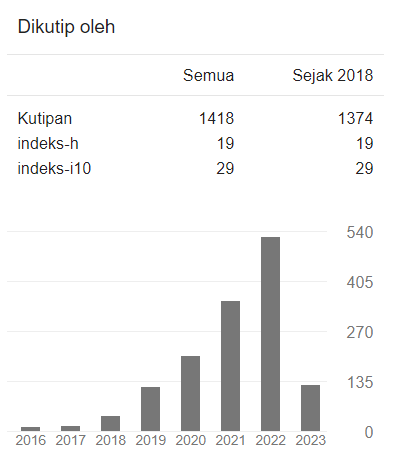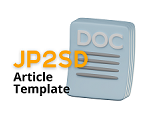ANALISIS BAHAN AJAR MATEMATIKA KELAS V SD DI KOTA MALANG
DOI:
https://doi.org/10.22219/jp2sd.v7i2.9692Keywords:
Teaching Materials, Mathematic, Elementary SchoolAbstract
The purpose of this paper is to explain the analysis of Mathematics teaching materials of Grade V Elementary Schools in Malang. The research method used is the type of qualitative research. The subject of this research is the fifth grade elementary school teacher in Malang. The type of data used is qualitative data obtained from the responses of teachers and students as users of teaching materials, as well as observational studies of the implementation of learning and documentation which includes the school curriculum, teaching material, and photos of learning activities. The research results that the teaching materials of Mathematics in Class V learning steps are accommodating for the achievement of learning objectives. The material is presented in an integrated and holistic manner according to the basic competencies that must be achieved. In general, the material is more on the discovery of concepts learned by students, not yet up to the application of concepts. Learning resources, facilities and learning experiences of students have not accommodated the local wisdomDownloads
References
Anggraini, Purwati., Kusniarti, Tuti. 2015. The Insertion of Local Wisdom into Instructional Materials of Bahasa Indonesia for 10th Grade Students in Senior High School. Journal of Education and Practice, 6 (33): 89-92.
Miles, M. B. & Hubberman, A.M. 1992. Analisis Data Kualitatif: Buku Sumber Tentang Metode-metode Baru Terjemahan Tjetjep Rohendi Rohidi. Jakarta: Universitas Indonesia Press.
Mukhtar. 2013. Pengembangan Bahan Ajar Metematika Berbasis Masalah untuk Memfasilitasi Pencapaian Kemampuan Penalaran dan Pemahaman Konsep Siswa. Prosiding Semirata FMIPA Universitas Lampung 353-360.
Mulhamah., Putrawangsa, Susilahudin. 2016. Penerapan Pembelajaran Kontekstual dalam Meningkatkan Kemampuan Pemecahan Masalah Matematika. Jurnal Pendidikan Matematika 10 (1): 59-80.
Musfiqi, Shinán., Jailani. 2014. Pengembangan Bahan Ajar Matematika yang Berorientasi pada Karakter dan Higher Order Thinking Skill (HOTS). Pythagoras Jurnal Pendidikan Matematika 9 (1): 45-49.
Nurhidayati, Siti., Tayeb, Thamrin., Baharuddin. 2017. Pengembangan Bahan Ajar Matematika Berbasis Masalah untuk Memfasilitasi Pencapaian Kemampuan Penalaran pada Pokok Bahasan Perbandingan Kelas VII MTsN Model Makassar. Jurnal Matematika dan Pembelajaran 5 (2): 236-250.
Pornpimon, C., Wallapha, A. & Prayuth, C. 2014. Strategy Challenges the Local Wisdom Applications Sustainability in Schools. Procedia-Social and Behavioral Sciences, 112: 626-634.
Rahmadani, Heni., Yenita, Roza., Murni, Atma. 2018. Analisis Kebutuhan Bahan Ajar Matematika Berbasis Teknologi Informasi (TI) di SMA IT Al Bayyinah Pekanbaru. Juring (Journal for Research in Mathematics Learning) 1 (1): 91-98.
Sugiyono. 2014. Metode Penelitian Pendidikan. Bandung: Alfabeta.
Widiati, Indah. 2015. Mengembangkan Kemmampuan Representasi Matematika Siswa Sekolah Menengah Pertama melalui Pembelajaran Kontekstual. Jurnal Pengajaran MIPA 20 (2): 106-111.
Yurniwati. 2015. Analisis Buku Teks Matematika untuk Siswa Sekolah Dasar. Jurnal Ilmiah PGSD 7 (1): 53-60.
Downloads
Published
Issue
Section
License
Authors who publish with Jurnal Pemikiran dan Pengembangan Sekolah Dasar (JP2SD) agree to the following terms:
- For all articles published in Jurnal Pemikiran dan Pengembangan Sekolah Dasar (JP2SD), copyright is retained by the authors. Authors give permission to the publisher to announce the work with conditions. When the manuscript is accepted for publication, the authors agree to automatic transfer of the publishing right to the publisher.
- Authors retain copyright and grant the journal right of first publication with the work simultaneously licensed under a Creative Commons Attribution-ShareAlike 4.0 International License that allows others to share the work with an acknowledgment of the work's authorship and initial publication in this journal.
- Authors are able to enter into separate, additional contractual arrangements for the non-exclusive distribution of the journal's published version of the work (e.g., post it to an institutional repository or publish it in a book), with an acknowledgment of its initial publication in this journal.
- Authors are permitted and encouraged to post their work online (e.g., in institutional repositories or on their website) prior to and during the submission process, as it can lead to productive exchanges, as well as earlier and greater citation of published work (See The Effect of Open Access).

This work is licensed under a Creative Commons Attribution-ShareAlike 4.0 International License.


















